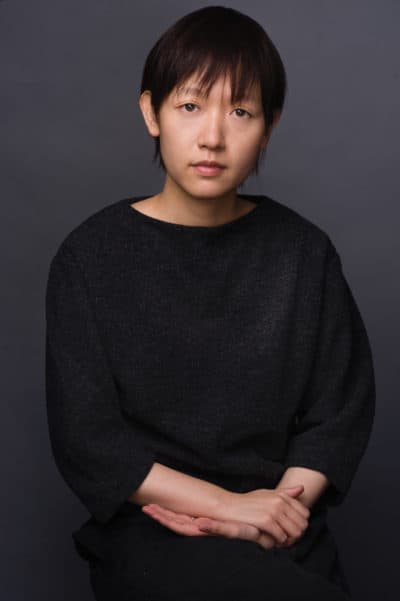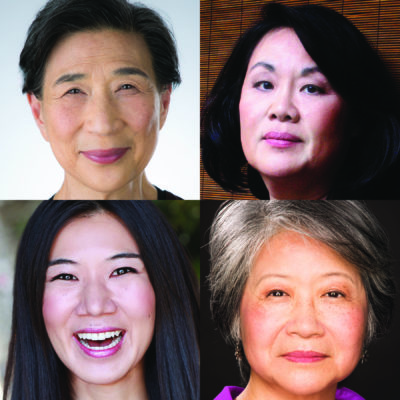Advertisement
In American Repertory Theater's 'Endlings,' Asian Women Claim Their Space

On a recent morning, an actor donned an orange wetsuit and plunged into Harvard’s Blodgett Pool to dive for shells. It was one in a series of biweekly pool rehearsals for “Endlings,” a play involving an on-stage pool that has its world premiere this month at the American Repertory Theater in Cambridge.
The word “endling” means the last of its species. Here, the endlings are three present-day haenyeos — Korean women sea divers who harvest shellfish and kelp from the ocean floor without modern diving equipment. It’s a tradition that dates back at least to the 17th century.
The dying haenyeo culture has been the focus of much media interest. It’s been featured in movies and TV shows, and recognized by UNESCO as a form of “intangible cultural heritage.”

“Endlings” playwright Celine Song was inspired by a Korean documentary. The hanyeos “would be like ‘I hate it. I want to quit today. I’ve been wanting to quit for years,’” Song recalls. But the documentarians wanted the haenyeos to say that they loved their lives on the island.
Song found it cringe-worthy.
She thought about the nostalgia we impose on people and ways we leave behind. Haenyeo life is hard and dangerous, and often born of necessity. Many lack access to education. They perform strenuous physical labor into their 80s and 90s, making little money doing work made obsolete by modern fishing technology.
So, Song wanted to write a play in which the Asian women reclaim their versions of the story — in a production that refuses whitewashing and acknowledges the politics around who gets to tell this story. In Song's telling, the last three haenyeos on earth are old, bored and darkly funny.
They complain about their aching bodies beaten by age, sea waves and husbands long passed. Their children have moved off-island and onto better lives. They’re living out their dead-end existence, with TV as their sole companion. “If you miss your husband / Watch TV / There are a lot of husbands on TV,” says haenyeo Han Sol.
“Endlings” is a play in two acts. Act I follows the daily life of the last haenyeos on Korea’s Man-Jae Island. Act II opens in Manhattan, in “a shitty little studio apartment in the East Village / Maybe even comically small,” with a conversation between a Korean-Western playwright and her “White Husband,” also a playwright, who has just finished reading Act I.
“Why aren’t you angry?” the Korean-Western playwright asks. “Usually you’re angry when you finish my plays because you’re so jealous.”
“There’s no way that I could have written this,” White Husband says, referencing the Asian subject matter. “So how could I be jealous of it?”
It’s a conversation Song says is “pretty autobiographical,” based on an interaction she had with her white playwright husband. Director Sammi Cannold describes Act II as “a meta-container around the first half of the play, [which] starts to dissect what it means for [Song], as a Korean, to be writing about these women and what it means to do it in the American theatrical landscape, which has been very white.”
At 25, Cannold is the second-youngest director of an A.R.T. production (in the A.R.T’s first season in 1980, Peter Sellars, then a 22-year-old undergraduate, directed “The Inspector General”). On first encounter, she was floored by the play. “I'd never read anything like it,” she says. “And also, I had never read anything [where] I immediately was like, ‘I want to direct this so badly.’ ” Cannold immersed herself in understanding haenyeo life. She and executive producer Diane Borger took a research trip to Jeju Island last fall, where they met with haenyeos in fishing villages. That's where they received four diving suits — gifts that will be displayed on set.
The script contains a set of detailed notes on casting the show’s Asian roles: “Most ideally, elderly Korean women will play the haenyeos. / Ideally, elderly Asian women of any ethnicity will play the haenyeos,” it states. “...Under no circumstances will any of these four roles be played by someone who is not Asian. No exceptions.”
For Jo Yang, a Chinese-American actor who plays a haenyeo in her 70s named Sook Ja, the play is a milestone for Asian actors. “It's very refreshing to have roles that are deep and elderly,” she says. “And we don’t have to speak with an accent.”
When Song was sitting down to write the play, it bothered her that someone might try to cast someone who wasn’t Asian in these roles. “I had a real moment where I was sitting there sweating about the possibility, and what I would have to do to not punch them,” she says.

It happens frequently on stage and onscreen: white actors taking on Asian roles, in stagings of the musical "Miss Saigon" and Gilbert and Sullivan’s "The Mikado," or Scarlett Johansson in "Ghost in the Shell" and Emma Watson in "Aloha."
“Honestly, if you are an Asian woman who, in your lifetime, have had your roles taken away by white women [in] yellowface, and you survived somehow, and you're still a working actor who gets gigs, you're a f------ pro,” Song says. To her, the "Endlings" actors are as skilled and tough as the haenyeos they portray.
Growing up, Song’s idols were white male playwrights: Bertolt Brecht, Edward Albee and Samuel Beckett. When she first immigrated to Canada, she was “keen to make as many non-Korean English-speaking friends as quickly as possible.” As a teenager gunning for the pantheon of top playwrights — almost all white men — her initial strategy was assimilation. She’d think, “I'm just as smart, I'm just as good.”
Now, at 30, Song refuses to fracture herself. “The truth is I am 100 percent Korean, I am 100 percent super Canadian, and I am 100 percent a New Yorker,” she says. She has realized, in owning all of her identities, that “it’s not that I’m just as good. I am better.”
“When your body is not [straight] white male, I think there is something we overcome to gain our self-esteem and our self confidence,” she says. “That I am 30, and I’m absolutely as confident as I am ... I would consider it some kind of survival.”
In “Endlings,” Celine Song writes an anti-nostalgic play that integrates the past with the current, and claims her space in the world now.
Previews for “Endlings” start Feb. 26; the show runs March 1 to 17 at the A.R.T.’s Loeb Drama Center.